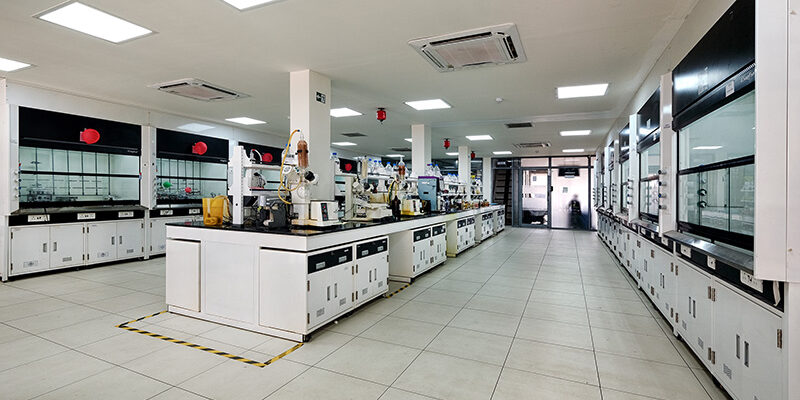Introduction
In the dynamic landscape of scientific research and experimentation, the importance of efficient laboratory furniture cannot be overstated. Over the years, India has witnessed a significant evolution in lab furniture solutions, transitioning from traditional setups to more contemporary and adaptable options. Among these, modular lab furniture has emerged as a game-changer, offering unparalleled flexibility, functionality, and aesthetics to meet the diverse needs of modern laboratories.
Evolution of Lab Furniture in India
Traditional Challenges
Historically, laboratories in India faced numerous challenges associated with rigid and outdated furniture designs. Fixed layouts often hindered workflow efficiency, while limited customization options failed to accommodate evolving research requirements.
Modern Solutions
In response to these challenges, the industry has witnessed a shift towards innovative and adaptable solutions. Modular lab furniture has gained popularity for its ability to address the shortcomings of traditional setups while offering a host of additional benefits.
The Modular Advantage
Modular lab furniture refers to a versatile system of interchangeable components that can be easily assembled, disassembled, and reconfigured to suit specific laboratory needs. This approach offers unparalleled flexibility and customization, allowing researchers to optimize their workspace according to evolving requirements.
Key Features of Modular Lab Furniture
Flexibility and Customization
One of the most significant advantages of modular lab furniture is its ability to adapt to changing needs. Researchers can easily reconfigure the layout, add or remove components, and adjust storage solutions to accommodate new equipment or experiments.
Cost-effectiveness
While the initial investment in modular lab furniture may seem higher than traditional options, its long-term cost-effectiveness is undeniable. The ability to reconfigure and reuse components minimizes the need for frequent replacements, ultimately reducing lifecycle costs.
Space Optimization
Modular designs maximize the efficient use of available space, making them ideal for laboratories with limited square footage. By eliminating wasted space and optimizing storage solutions, researchers can create a more functional and organized workspace.
Durability and Sustainability
High-quality materials and robust construction ensure the durability of modular lab furniture, providing long-lasting support for research activities. Additionally, many manufacturers prioritize sustainability by using eco-friendly materials and production processes, minimizing environmental impact.
Applications and Industries
Modular lab furniture finds applications across various industries and institutions, including academic research facilities, pharmaceutical companies, biotech firms, and more. Its versatility makes it suitable for a wide range of laboratory settings, from small-scale research labs to large-scale production facilities.
Advantages Over Conventional Furniture
Adaptability to Changing Needs
Unlike traditional fixed furniture, modular lab setups can easily adapt to accommodate new equipment, experiments, or research methodologies. This flexibility future-proofs the laboratory against evolving requirements.
Enhanced Workflow Efficiency
By allowing researchers to customize their workspace according to specific tasks, modular lab furniture promotes efficient workflow management. Ergonomically designed workstations and optimized storage solutions minimize clutter and streamline processes, improving overall productivity.
Improved Aesthetics
In addition to its functional benefits, modular lab furniture offers aesthetic advantages, creating a modern and professional workspace. Sleek designs, customizable finishes, and integrated storage solutions contribute to a visually appealing environment conducive to scientific innovation.
Factors to Consider Before Investing
Before investing in modular lab furniture, researchers should consider several factors to ensure the best possible outcome. Budget constraints, space requirements, functional needs, and future expansion plans should all be carefully evaluated to select the most suitable solution.
Sustainability and Environmental Impact
The environmental impact of laboratory operations is an increasingly important consideration for researchers and institutions. Modular lab furniture manufacturers are responding to this demand by prioritizing sustainability in their designs, using recyclable materials, energy-efficient manufacturing processes, and waste-reduction strategies.
Case Studies
Numerous case studies highlight the successful implementation of modular lab furniture in diverse laboratory settings. From academic research labs to industrial facilities, users praise the flexibility, durability, and functionality of modular setups, citing significant improvements in workflow efficiency and research outcomes.
Future Trends and Innovations
As technology continues to advance, the future of modular lab furniture looks promising. Innovations such as integrated IoT sensors, automated workflows, and smart storage solutions are poised to revolutionize laboratory operations, further enhancing efficiency, productivity, and sustainability.
Conclusion
The modular advantage offered by contemporary lab furniture solutions has transformed the way researchers in India approach laboratory design and functionality. By embracing flexibility, customization, and sustainability, modular setups empower scientists to push the boundaries of scientific exploration and innovation.
FAQs
1.Q: Is modular lab furniture suitable for all types of laboratories?
1.A: Yes, modular lab furniture can be customized to meet the specific needs of various industries and research fields, making it suitable for a wide range of applications.
Q.2: What are the primary benefits of investing in modular lab furniture?
A.2: The primary benefits include flexibility, cost-effectiveness, space optimization, durability, and sustainability.
Q.3: How does modular lab furniture contribute to sustainability?
A.3: Modular lab furniture manufacturers prioritize sustainability by using eco-friendly materials, energy-efficient manufacturing processes, and waste-reduction strategies.
Q.4: Can existing laboratories transition to modular setups?
A.4: Yes, existing laboratories can transition to modular setups by replacing or reconfiguring their current furniture to better suit their needs.
Q.5: Are there any limitations to modular lab furniture?
A.5: While modular lab furniture offers numerous advantages, it may not be suitable for extremely specialized or highly regulated environments where specific design requirements must be met.

